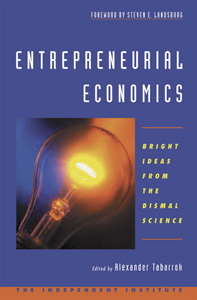
Home
Comments
Summary
Contents
Foreword
About the Authors
Media Reviews
Editor Presentations
Buy the Book
Visit the Independent Institute

Edited by Alexander Tabarrok
Foreword by Steven E. Landsburg:
 Would you rather live in a world without blood transfusions or a world without maritime insurance? Blood transfusions are dramatic and memorable (which is why we see them on prime time hospital shows), while the facilitation of commerce through risk sharing is routine and easily taken for granted. But I'd be willing to bet that by almost any measure, three centuries of organized insurance markets have contributed more to human happiness than three centuries of transfused blood.
Would you rather live in a world without blood transfusions or a world without maritime insurance? Blood transfusions are dramatic and memorable (which is why we see them on prime time hospital shows), while the facilitation of commerce through risk sharing is routine and easily taken for granted. But I'd be willing to bet that by almost any measure, three centuries of organized insurance markets have contributed more to human happiness than three centuries of transfused blood.
Would you rather live in a world without personal computers or a world without junk bonds? It’s both obvious and true that your computer runs wonderful software. It’s less obvious but equally true that a lot of that software was developed only because some entrepreneur was able to finance a risky venture. The unprecedented prosperity of the past two decades is due partly to innovations in information technology and partly to innovations in the organization of financial markets. I don’t know which has contributed more. (The question is very much complicated by the fact that each kind of innovation feeds off the other.) The obvious lower bounds offer no guidance: In the late 1980s, Microsoft’s annual economic profit and Michael Milken’s annual income were both in the same neighborhood at about $600 million.
Invention is the engine of prosperity, but inventions come in many forms. The internal combustion engine is an invention, and so is the system of just-in-time inventory management. Economists study the causes and effects of both. But nobody turns to economists to design a better car, so why should anybody turn to economists to design a better market?
Many economists would answer that there is no good answer. Their position is that we, as a profession, have no more business designing markets than we have designing cars; our job is to understand existing institutions, not to improve them; we are scientists, not engineers.
But if economists don’t design better markets, who will? The mantra of positive economics is that we can’t give advice on improving efficiency because anything that’s efficient has already been adopted. But that mantra founders on two counts, both of which will be obvious to anyone who glances more than casually at the articles in this volume. First, a lot of market innovations yield benefits that are difficult to capture privately, so even if we can rely on the entrepreneurs to invent just-in-time inventory management, we can’t rely on them to invent markets for everything. Second, and more to the point, economists can be very good at thinking about markets. Electric light was inefficient until Thomas Edison had a good idea. Private patent markets were inefficient until Michael Kremer figured out how to organize them (see his paper in this volume); if Edison can change the world, why can’t Kremer?
Economists have a lot of socially useful tasks to perform. One of those tasks is to translate our understanding and appreciation for markets into innovative proposals for making the world run more efficiently. The papers in this book prove that at least some of us can do that.
We can do that partly because we are in the habit of thinking hard about the design of incentives and the assignment of property rights. Some of these papers are about how governments can assign property rights more efficiently; others suggest new ways for entrepreneurs to create and sell new kinds of property rights.
I learned a lot reading Entrepreneurial Economics, and I’ll surely steal some of the ideas for use in future books and columns. I hope others steal them for use, not just entertainment. Unfortunately, there are no property rights in the ideas themselves. That suggests we’re not getting enough of them. Let’s cherish the ones we’ve got.